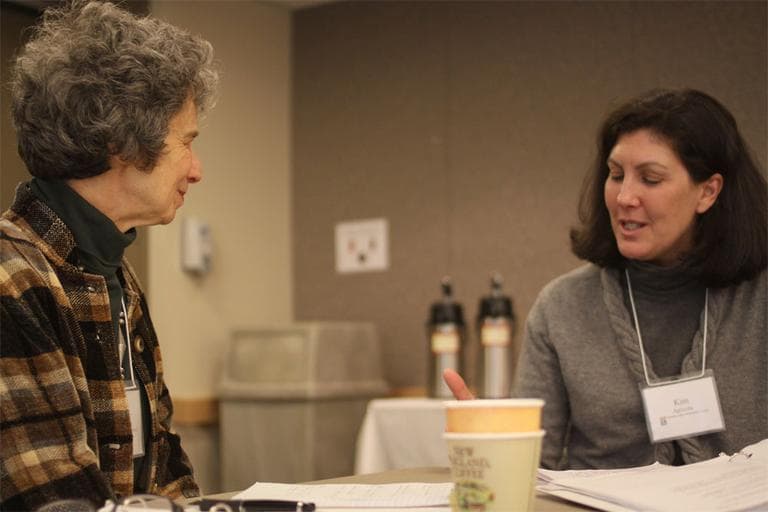Advertisement
Workshops Explore How To Care For Aging Mom And Dad
Resume
If you have aging parents, maybe you've had the kind of realization that Jim Beimford recently had about his 82-year-old mother.
"I should have been in charge of my mom 18 months ago from a driving perspective," Beimford says. "She was pulling U-turns on bridges, and red lights were just an optional thing."
Because Beimford lives in Hopkinton and his mother lives in Ohio, that made things tricky when he realized he needed to take her car keys away. He says it wasn't until an aunt called and said, "Jimmy, you've got to get your mother out of the car!" that he intervened.
Every single day, people all over the country get calls like that. "Mom caused a car accident." "Dad had a stroke." "One of them fell and broke a hip." And because the fastest-growing part of our population is over the age of 85, those kinds of calls are going to become more and more frequent.
"If we don't consider ourselves part of this, we’re setting our society up for an implosion where there's not enough capacity to care for the elders in our society."
Ned Rimer, Chronic Care Community Corps
"Everyone I know, because of the age I'm at, is dealing with this with their parents or their in-laws or a neighbor," says 49-year-old Kim Agricola, who, along with Beimford, recently attended a workshop that's teaching folks to be more prepared when that dreaded phone call comes for them.
"My mother had a terrible fall last year and it took my dad almost two weeks to get a home health aide in place because of the process," recalls Agricola, who lives in Medfield. "Now, there are many people who have gone through this process that probably could have helped him make that happen in one day. There has to be a better way of communicating and not having to reinvent the wheel."
A Newton nonprofit called the Chronic Care Community Corps, which runs this workshop, is trying to find that better way. It wants to use the experiences of people who've been through these crises to help others just starting to face them, and to train people to do more than just express sympathy or show up with a casserole when someone they know is coping with an aging friend or relative.
Because, as Agricola puts it: "We all want to live this long, full life and then just drop dead one day or not wake up, and it doesn't work that way."
One training technique at this workshop is role playing. The idea is that if people act out real-life scenarios, they can practice how to support each other as they care for the sick and the elderly.
In one role play, two workshop members act out the stress that can build up between siblings as they care for aging parents.
"My brother just won't engage," says one of the workshop actors. "I wish he'd do more."
"Have you had a conversation with him about that at all? Like, have you been able to work out who's doing what for mom?" asks the other actor.
"No, what happens is he calls and says, 'Why haven't you done the proxy stuff? Why haven't you done this? Why haven't you done that?' "
"You sound really frustrated."
"I am."
"Yeah, yeah, I hear you," the other actor replies. Then, turning to the rest of the workshop members, she makes a confession: "I'm not sure where to go from here!"
A lot of people aren't sure where to go from here when they encounter emotionally difficult situations like this. Yet this is the kind of family dynamic that comes up all the time when a parent starts to decline. That's why Ned Rimer, the founder of the Chronic Care Community Corps, says practicing these conversations is so important.
"You can Google a tactical question like 'How do you assess this nursing home versus that nursing home?' " he says, "but you don't even know how to Google something like 'struggling with my sisters around caring for mom.' Yet it's amazing how often when you ask someone what worries you the most, it's not the illness. It's something else that's going on."
But those questions will come up again and again as more of us care for our parents, spouses, family and friends coping with the problems that come with aging.
"Just look at the demographic trends," Rimer adds. "If we don't consider ourselves part of this, we’re setting our society up for an implosion where there's not enough capacity to care for the elders in our society. Society and community has to get off the sideline and play a role in the future health care of our aging population."
Rimer's training workshop met twice last week and will meet again six months from now to check on the group's progress. WBUR's All Things Considered plans to track these workshop members as they put their training into practice — so stay tuned for future updates.
This program aired on March 15, 2011.
